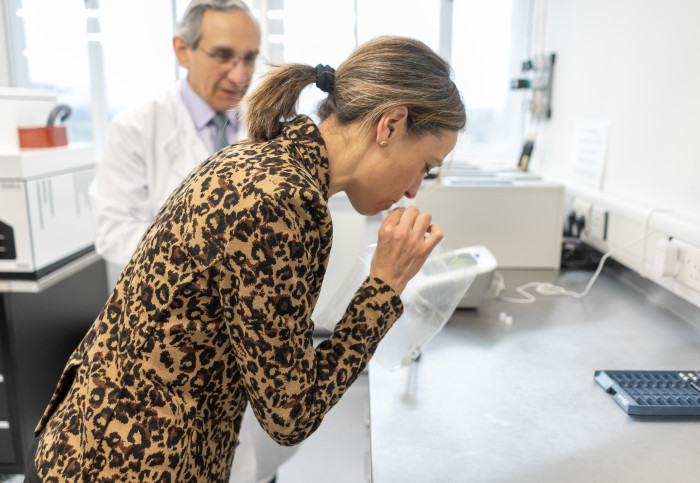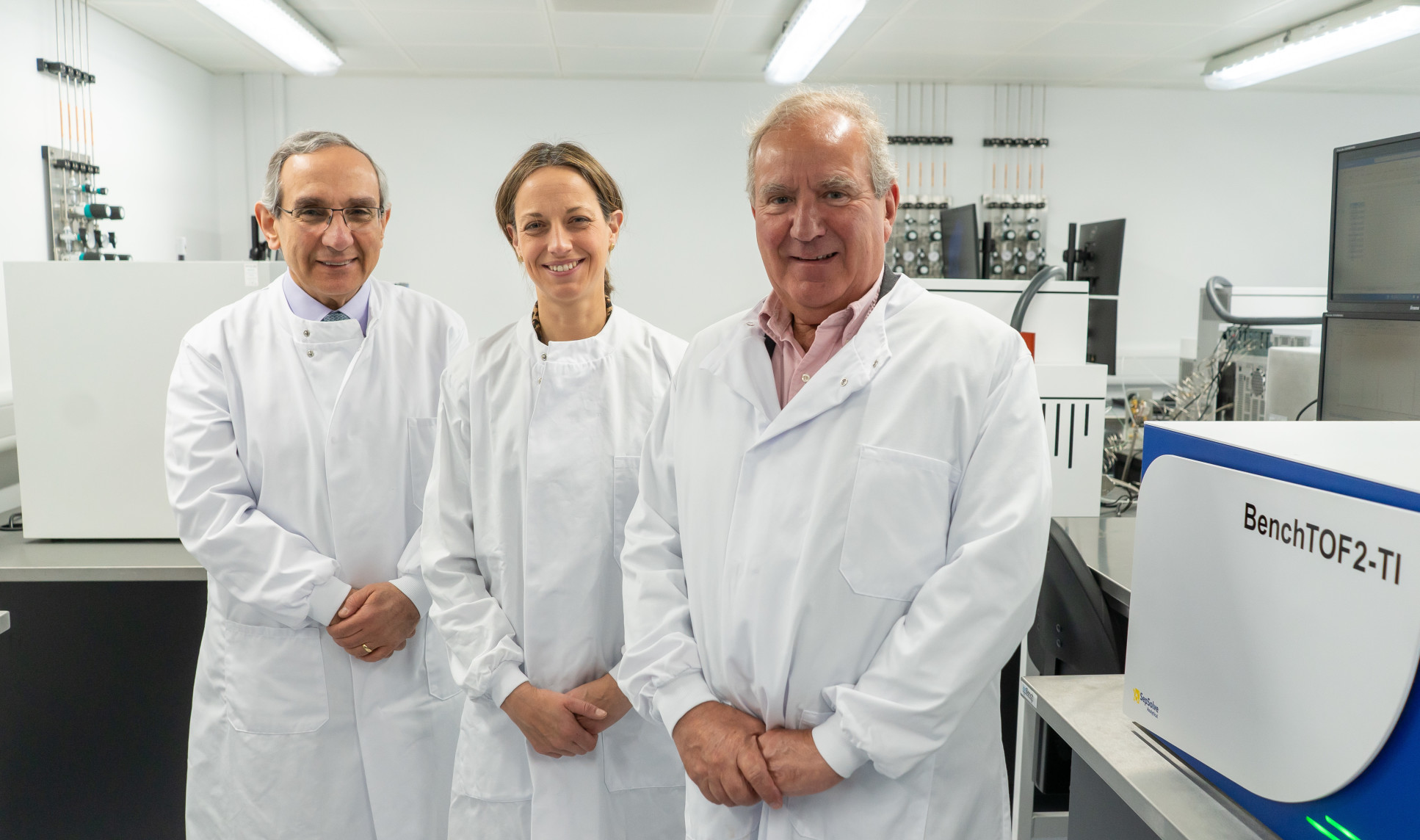Social Care Minister visits Imperial for launch of cancer breath test study

Minister for Social Care Helen Whately MP visited the Hammersmith Campus last week to discuss Imperial’s research on diagnosing cancer.
Ms Whately met Professor George Hanna, Head of the Department of Surgery and Cancer, Professor Jonathan Weber, Dean of the Faculty of Medicine, and representatives from the charity Pancreatic Cancer UK on Thursday last week to see Professor Hanna’s work on developing breath tests to detect cancer earlier.
The visit coincided with the announcement of a new clinical study, funded by Pancreatic Cancer UK, to develop the world’s first breath test to detect pancreatic cancer. If successful, this breath test could detect this cancer early enough to save thousands of lives each year.
"The breath test is non-invasive, easy to complete and universally acceptable to patients. If the breath test is successfully developed, it has great potential to influence clinical practice." Professor George Hanna Department of Surgery and Cancer
Researchers at Imperial College London, led by Professor Hanna, are studying how breath samples taken in a GP surgery could ensure people with early pancreatic cancer symptoms, which are often mistaken for other less serious health conditions, are rapidly referred for scans and lifesaving treatment.
At the visit to Imperial’s Commonwealth Building at Hammersmith Hospital, Ms Whately discussed this research with Professor Hanna and Professor Weber and saw first-hand how the simple breath test works.
The test detects volatile organic compounds (VOCs) present in the breath. Thousands of chemicals travel around the bloodstream and are filtered out when the blood reaches the lungs, and then breathed out. Cancer cells make different types of chemicals that are detectable in the breath even at the early stages of disease.
Researchers will collect and analyse samples from 700 people with and without pancreatic cancer, as well as samples from those with other conditions that affect the pancreas.
Isolating unique combinations of VOCs should enable doctors to identify people who are likely to have pancreatic cancer among the large numbers of people with similar vague symptoms. This will allow them to be quickly referred for urgent investigation.
Ms Whately said: “The earlier we catch cancer, the more likely we are to beat it. That’s why breath tests like these could be such an important breakthrough - helping thousands of people get a potentially life-saving early diagnosis.
“Take pancreatic cancer for example, a really nasty disease with a lower survival rate than other cancers. It’s tough to detect as the symptoms are often similar to other conditions, and that means less than one in four cases are currently caught at an early stage. This technology could change that. With nearly 10,000 people currently affected in the UK it’s easy to see how big a lifeline this might be.”
She added: “Imperial College London is doing incredible work trialing these new tests, supported by Pancreatic Cancer UK who are helping funding some of the research.
“These tests, and similar ones looking to detect oesophageal and colorectal cancer, are just one example of the huge efforts being made by scientists, charities and the government to combat cancer.”
Ninety-one per cent of people with pancreatic cancer see their GP with symptoms two years before diagnosis, but currently just 10 per cent are diagnosed in time for surgery, which is the only potentially curative treatment.
Pancreatic Cancer UK believes the breath test could transform survival rates, which have barely improved in 50 years. It has invested more than £650,000 in the two-year project, which aims to develop a test that can be taken forward into a large-scale clinical trial.
Unlike other cancers, no screening or early detection tests for pancreatic cancer currently exist to help doctors. The disease’s vague symptoms - such as back pain and indigestion – mean that it often goes undetected until after it has spread to other parts of the body. More than half of people with pancreatic cancer die within three months of diagnosis, making it the deadliest common cancer.
Around 10,500 people are diagnosed with pancreatic cancer per year in the UK and around 8,924 people die every year of the disease in the UK.

Professor Hanna said: “The breath test is non-invasive, easy to complete and universally acceptable to patients. If the breath test is successfully developed, it has great potential to influence clinical practice.
“If a GP is presented with a patient with recent gastrointestinal symptoms that may be benign or indicate cancer, they would not need to watch and wait to see if symptoms worsen but could offer the breath test immediately.
“A positive test would warrant an urgent referral for specialised tests, whereas a negative test would enable the GP to reassure the patient and offer retesting if symptoms persist.”
"Finding an early detection test would make the single biggest difference to pancreatic cancer survival in 50 years." Dr Chris MacDonald Pancreatic Cancer UK
The ultimate aim for Professor Hanna’s research is to develop a pan-cancer breath test, which could be used to detect and distinguish between a number of different gastrointestinal cancers.
Scientists at Imperial College London and clinicians at Imperial College Healthcare NHS Trust, led by Professor Hanna, first developed a breath test to diagnose oesophageal and gastric cancer in 2015. Professor Hanna and his colleagues carried out further trials to see if the tests could diagnose other cancers, such as pancreatic cancer in 2018.
Dr Chris MacDonald, Head of Research at Pancreatic Cancer UK, said: “Finding an early detection test would make the single biggest difference to pancreatic cancer survival in 50 years. We know that the vast majority of patients will present with early symptoms two years before they are diagnosed, so there’s a huge window of opportunity there, if we can give GPs the new tools they need.
“Currently they face a near impossible task in deciding who among all the people they see with common problems like backpain, indigestion or changes to their poo, might in fact have the deadliest common cancer.
“If the brilliant team at Imperial are successful, we can take luck out of the equation for people with pancreatic cancer. In future, simply blowing into a bag at the GP surgery could quickly open the way for an urgent scan, and for those that need it, the chance of potentially curative treatment. I really do believe that through this project and others, we are on the cusp of a breakthrough that could save thousands of lives.”
Main image credit: Jeff Moore/Pancreatic Cancer UK.
Article text (excluding photos or graphics) © Imperial College London.
Photos and graphics subject to third party copyright used with permission or © Imperial College London.
Reporter
Conrad Duncan
Communications Division
